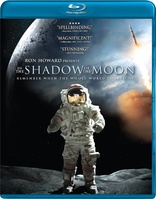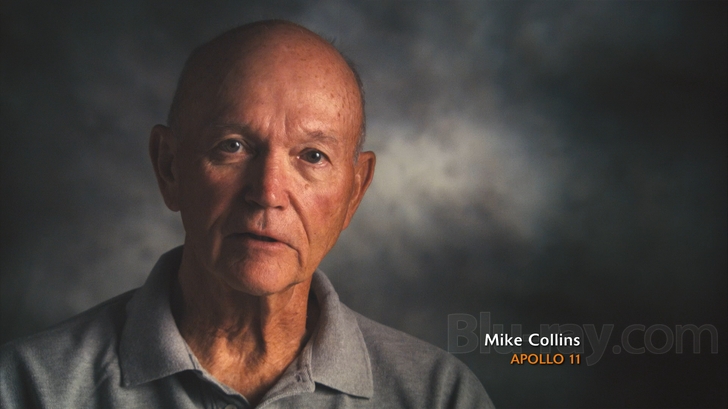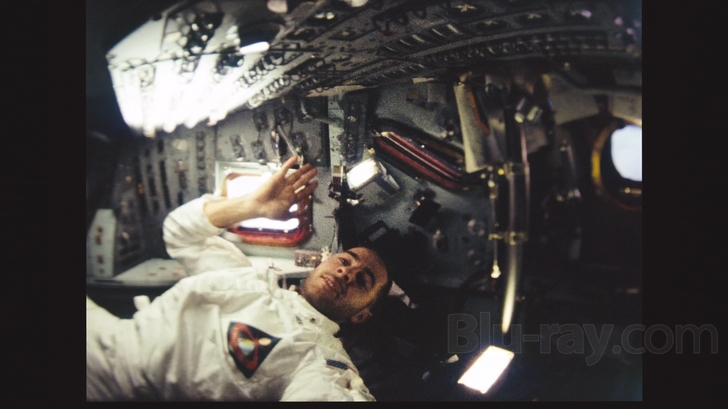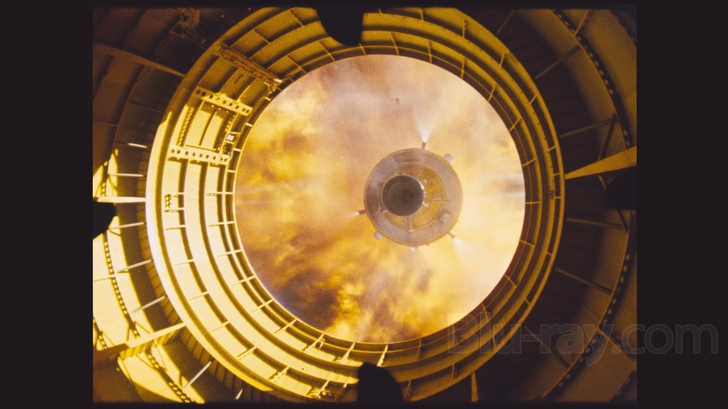In the Shadow of the Moon Blu-ray Movie
HomeIn the Shadow of the Moon Blu-ray Movie 
Image Entertainment | 2007 | 100 min | Rated PG | Aug 10, 2010
Movie rating
8 | / 10 |
Blu-ray rating
| Users | 3.8 | |
| Reviewer | 4.0 | |
| Overall | 4.0 |
Overview
In the Shadow of the Moon (2007)
Between 1968 and 1972, nine U.S. spacecraft voyaged to the Moon, and 12 men walked upon its surface. They remain the only human beings to have stood on another world. This chronicle brings together, possibly for the first and last time, the surviving crew members from every single Apollo mission that flew to the Moon; it also allows them to tell their story in their own words. First-hand testimony is interwoven with visual archival material which has been re-mastered from the original NASA film footage--much of it never used before. As a result, this space 'epic' communicates the daring, the danger, the pride, and the promise of this extraordinary era in history when the whole world literally looked up at the United States of America.
Starring: Buzz AldrinDirector: David Sington
| Documentary | 100% |
| Nature | 62% |
Specifications
Video
Video codec: MPEG-4 AVC
Video resolution: 1080p
Aspect ratio: 1.78:1, 1.33:1
Original aspect ratio: 1.85:1
Audio
English: DTS-HD Master Audio 5.1 (48kHz, 24-bit)
Subtitles
None
Discs
25GB Blu-ray Disc
Single disc (1 BD)
Playback
Region A (C untested)
Review
Rating summary
| Movie | 4.0 | |
| Video | 4.0 | |
| Audio | 4.0 | |
| Extras | 3.0 | |
| Overall | 4.0 |
In the Shadow of the Moon Blu-ray Movie Review
The men on the moon, in their own words…
Reviewed by Casey Broadwater October 4, 2010On May 25, 1961, President John F. Kennedy, during a joint session of Congress, put forth a seemingly impossible challenge:
“I believe that this nation should commit itself to achieving the goal, before this decade is out, of landing a man on the Moon and returning him safely
to the Earth. No single space project in this period will be more impressive to mankind, or more important in the long-range exploration of space; and
none will be so difficult or expensive to accomplish.”
Just over 8 years and countless technological innovations later, we did it—sent a team of three men hurtling toward the moon, some 238,000 miles
away, in a tiny capsule. While Michael Collins orbited our nearest celestial neighbor in the command module, Neil Armstrong and Edwin “Buzz” Aldrin
descended to the surface in the Eagle lunar lander. With the eyes of the world watching, Armstrong exited the spacecraft, descended the ladder, and
made one small step for a man, one giant leap for mankind.

A cynic would say that the Apollo program was motivated by a Cold War need to best the Soviets in the space race, and he wouldn’t be entirely wrong. Our technological capabilities coincided perfectly with the politics of the time, initiating a rush for the moon driven just as much by nationalism as the inherent value of human exploration and scientific progress. Could you imagine President Obama issuing an explicit challenge to land a man on Mars—and return him safely to Earth, of course—by the end of the decade? The left would demand the project be cut and the funds poured into social issues, while the Tea Partying public on the right would rail on and on about stamping out big-ticket government spending. (Maybe things would be different if Al-Qaeda was planning a Mars mission.) The fact is, without the political game of one-upmanship with the Russians, America would’ve had no real impetus to make it to the moon. What’s striking, though, is that once the astronauts of the Apollo program broke free from Earth’s orbit and watched the planet shrink into a pale blue, ridiculously small dot, the entire concept of nationalism became laughably absurd. As one astronaut notes in Shadow of the Moon—an awe-inspiring new documentary about the Apollo program—from the lunar surface, you can hold up your thumb and completely block the Earth from view.
It’s fitting, then, that In the Shadow of the Moon makes little mention of the space race, preferring to focus instead on the direct experiences of an elite few—the men who journeyed to the moon and back. The film features ten of the eighteen surviving Apollo astronauts, and these now-elderly rocketeers—jovial and eager to tell their tales—serve as a collective narrator, by turns wistful and disbelieving, still in awe of the immense privilege they were granted. (“I called the moon my home for three days of my life, says Apollo 17’s Eugene Cernan, “that’s science fiction!”) Neil Armstrong is unfortunately missing—he feels he gets too much undeserved attention for being “first,” and has faded, in recent years, from the media limelight—but familiar faces like Buzz Aldrin, Michael Collins, and Apollo 13 commander Jim Lovell turn up, along with others who may not be household names, but damn well should be. They guide us through the feelings of being an astronaut in the 1960s—the worries and exhilaration, even the guilt over not serving in Vietnam—and the documentary eventually takes a turn to the near-spiritual. If there’s one thing that all of the men have in common, it’s that the experience of leaving the confines of the Earth and seeing it glimmer dimly in the void like “a jewel hung in the blackness” has made them more appreciative, more prone to speak in vaguely philosophical statements about Earth’s fragility, life’s preciousness, and how “our terrestrial squabbles don’t seem so important” when viewed from the surface of the moon. The sentiments, if you or I spoke them, would sound mildly corny, but coming from these veritable space travelers, they seem earnest and earned.
There’s been a surfeit of documentaries and TV programs related to the Apollo program in recent years—due to renewed interest surrounding the 40th anniversary of the first lunar landing—so it’s quite a challenge to present the same story in a different way. Director David Sington has dug up some fresh footage from the NASA archives, and his approach of using the astronauts’ own words as narration is effective, but in many ways, In the Shadow of the Moon is yet another traditionally structured documentary—talking heads interspliced with archival material—that doesn’t tell us much that we don’t already know. This doesn’t mean it’s not entertaining or inspirational—it is, and I fall into a trance-like state of awe every time I see those white-suited spacemen bunnyhopping across the face of the moon—it’s just that, well, we’ve seen it all before. Al Reinert’s incomparably poetic and unconventional For All Mankind turns the entire Apollo program into a singular voyage of human accomplishment, and series like When We Left Earth present much more concrete information than you’ll find here. In the Shadow of the Moon tries for a little of both—poetic grandeur and factual accounts—but it’s not quite as successful as either. Still, this might be the last chance for these rapidly aging astronauts to give their personal thoughts on the part they played in history, which is reason enough to watch.
In the Shadow of the Moon Blu-ray Movie, Video Quality 

Comprised of both high definition video "talking head" interviews and archival material shot on a variety of stocks—displaying varying aspect ratios and levels of damage/image quality—In the Shadow of the Moon's 1080p/AVC-encoded transfer is nevertheless consistent in what really matters: it faithfully reproduces all of the footage, warts and all, with no unnecessary digital tweaking. While the producers probably could've cleaned up some of the material, they've opted to leave it as it is, and I think this is a wise choice. It adds to the vintage vibe of the film and also keeps the footage free of distracting digital artifacts. The quality of the archival material is all over the place—crisp 35mm, handheld footage shot by the astronauts on 16mm, primitive video from 1960s TV broadcasts—but it all looks faithful to source. And some of it looks absolutely fantastic, particularly the shots of the rockets lifting off and the boosters separating. The entire frame of the image is always shown, even if that means we see bits of dirt and hair stuck in the film gate near the edges of the picture. Of course, you can also expect lots of white flecks, mild scratches, and occasional print damage. The contemporary interview footage is quite sharp—seriously, you can make out every pock and pore on Buzz Aldrin's characteristically craggy face—and skin tones are natural, if a bit intentionally golden. I don't think anyone would have any real complaints about the picture quality here—the vintage footage looks exactly like it's supposed to, and the modern material is crisp and clean.
In the Shadow of the Moon Blu-ray Movie, Audio Quality 

Likewise, viewers will have no qualms with the film's lossless DTS-HD Master Audio 5.1 surround track, which presents the vintage recordings as cleanly as possible and offers up expectedly clear narration from the interviews with the participating astronauts. Some attempt has been made to move certain sounds into the rear speakers—the rapid deployment of parachutes, a P-51 Mustang zipping between channels, hovering helicopters—and these effects are complimentary and unobtrusive. (Meaning, they seem natural and don't stand out awkwardly.) Even the .1 LFE channel gets a few chances to rumble during liftoffs and explosions. The most dynamic and expressive element of the track, though, is Philip Sheppard's excellent score, which combines orchestral Americana—"Amish barn-raising" music, according to director David Sington in his commentary—with more ambient arrangements. (It doesn't, however, hold a candle to Brian Eno's haunting For All Mankind score.) Disappointingly, there are no subtitles whatsoever, even though the back of the case claims English SDH and Spanish options. (Useful for me when I'm digging up quotes for the review, but absolutely essential for viewers who are hard-of-hearing.)
In the Shadow of the Moon Blu-ray Movie, Special Features and Extras 

Filmmaker Commentary
Director David Sington, Editor David Fairhead, and Archive Producer Chris Riley join forces for a track that's definitely informative, especially if you're
interested in how documentarians procure and use archival footage.
Bonus Interviews & Stories (SD, 57:24)
There's a whole second documentary worth of additional material here, including segments about Sputnick, the Cold War, the dark side of the moon, and
the process of docking in space.
Scoring Apollo: A Short Feature with Composer Philip Sheppard (SD, 11:13)
Composer Philip Sheppard talks having perfect pitch and his ability to "hallucinate music," and we also get to see footage of the orchestra recording the
score.
Ron Howard: Inspired by Apollo (SD, 6:34)
Howard says a few words about the Apollo program, which is obviously near and dear to his heart.
Trailer (SD, 2:37)
In the Shadow of the Moon Blu-ray Movie, Overall Score and Recommendation 

While neither as poetic as For All Mankind or as concretely informative as the When We Left Earth series, In the Shadow of the Moon—which tries both tacks—is nevertheless awe-inspiring, a reminder of Earth's fragility in the void of space and the courage of the 24 men who set out through the darkness for our nearest terrestrial neighbor, making a "giant leap for mankind" in the process. The documentary doesn't present much new material, but I never get tired of archival NASA footage, especially when it looks this good on Blu-ray. Recommended!
Similar titles
Similar titles you might also like

When We Left Earth: The NASA Missions
2007

Wonders of the Solar System
2010

The Universe: 7 Wonders of the Solar System 3D
2010

Journey to the Edge of the Universe
2009

Armstrong
2019

Wonders of the Universe
BBC
2011

Baraka
1992

Steep
2007

Earth: The Biography
2007

IMAX: Hubble 3D
2010

Chronos
IMAX
1985

Space Station 3D
IMAX
2002

Galápagos
2006

Planet Earth
The Complete Series | Special Edition
2006

Blue Planet
Double Feature with The Dream is Alive
1990

Human Planet: The Complete Series
BBC
2011

Space Junk 3D
IMAX
2013

Ganges
2007

Planet Earth III 4K
2023

For All Mankind 4K
1989